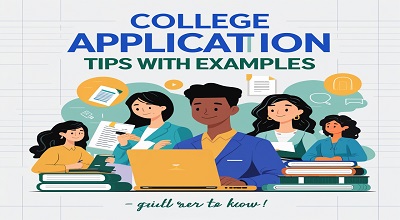College Application Tips
College Application Tips refer to practical strategies, advice, and best practices to help students complete their college application process. The tips aim to maximize the chances of getting accepted by presenting a well-rounded and compelling application. These tips often cover various aspects of the application, from choosing the right colleges to writing a standout personal statement, gathering strong letters of recommendation, and meeting all application requirements within the deadlines.
Some key college application tips include:
Be Organized and Meet Deadlines:
Keep track of application deadlines, submission requirements, and additional materials like transcripts or test scores to ensure you meet all deadlines.
Start Early:
Begin preparing for the college application process well in advance. Research colleges, understand their requirements, and start writing your essays and gathering materials months before deadlines.
Choose the Right Colleges:
Select colleges that align with your academic interests, career goals, and personal preferences. Consider location, size, campus culture, and academic programs when narrowing down your choices.
Create a Well-Structured Application:
Make sure your application is complete, neat, and error-free. Pay attention to details, like filling out forms correctly and adhering to word limits.
Write a Compelling Personal Statement:
Your college essay is an opportunity to showcase your personality, experiences, and goals. Be authentic and tell your story in a way that highlights your strengths and motivations.
Secure Strong Letters of Recommendation:
Choose recommenders who know you well and can speak to your strengths and potential. Give them ample time to write thoughtful and personalized letters.
Highlight Extracurricular Activities:
Focus on meaningful extracurricular activities, internships, or volunteer work that demonstrate your skills, leadership, and commitment.
Proofread and Revise:
Always review your application before submitting it. Ask others, such as teachers or mentors, to provide feedback on your essays and application forms.
Introduction
- Briefly introduce the importance of college applications.
- Explain how the application process has evolved over time.
- Mention the significance of applying with a strategic approach.
Understanding the College Application Process
Overview of the College Application Process
- Key steps involved (researching colleges, application forms, deadlines).
- Types of applications (Common App, Coalition App, individual school applications).
- The role of standardized tests (SAT, ACT, and others).
Different Types of College Applications
- Regular decision vs. early action vs. early decision.
- Advantages and disadvantages of each type of application.
- Tips for choosing the right type based on personal goals and situation.
Building Your College Application
Choosing the Right Colleges for Your Application
- Research strategies for selecting the best fit colleges.
- Considerations: academic strengths, location, size, campus culture.
- Example of how a student chose their list of colleges based on academic and personal preferences.
College Essays: Crafting a Compelling Narrative
- Importance of personal statements and supplemental essays.
- Steps for writing a strong college essay.
- Example of a personal statement that stood out and why it worked.
Letters of Recommendation: How to Secure Strong Recommendations
- How to ask for recommendations.
- Choosing the right recommenders (teachers, mentors, employers).
- Example of a well-crafted letter of recommendation.
Extracurricular Activities: Showcasing Your Interests
- How to effectively highlight extracurriculars in your application.
- Importance of quality over quantity in extracurriculars.
- Example of how involvement in volunteer work or leadership positions can strengthen an application.
Maximizing Your College Application: Additional Tips
Proofreading and Revising Your Application
- The importance of revising and proofreading your essays, application forms, and resume.
- How to seek feedback from teachers, mentors, or professional services.
- Example of a common mistake made during proofreading and how it was corrected.
Using Your Application to Stand Out
- How to add personal touches to your application that reflect your unique experiences.
- Examples of standout application strategies from successful candidates.
How to Handle Multiple Offers and Waitlists?
- What to do when you’re placed on a waitlist.
- Strategies for making your case if you’re on the waitlist.
- Example of a student who successfully navigated the waitlist process.
Understanding Financial Aid and Scholarships
The Role of Financial Aid in the College Application Process
- Types of financial aid (loans, grants, work-study).
- How to apply for financial aid (FAFSA, CSS Profile).
- Example of how financial aid was factored into the college decision-making process.
Scholarships: Finding and Applying for Opportunities
- Types of scholarships (merit-based, need-based, and special interest scholarships).
- Strategies for finding scholarships that align with your qualifications.
- Example of a student who secured a scholarship through perseverance.
Managing the Stress of the College Application Process
Managing Deadlines and Time
- Tips for staying organized and meeting deadlines.
- Using tools like spreadsheets or apps to keep track of tasks.
- Example of a student who successfully juggled application deadlines and other responsibilities.
Coping with Rejection and Staying Positive
- How to handle rejection and stay motivated for future opportunities.
- The importance of persistence and resilience.
- Example of a student who turned rejection into a learning opportunity.
Conclusion
- Recap the importance of approaching the college application process strategically.
- Encourage students to apply with confidence and authenticity.
- Final tips and words of encouragement.
FAQs
What is the most important part of a college application?
Detailed response with examples of factors like essays, recommendation letters, and extracurriculars.
How do I write a college essay that stands out?
Tips on crafting a personal and compelling essay with examples.
When should I start my college applications?
Timeline of tasks leading up to application deadlines with suggestions on when to start.
What should I do if I don’t get into my top choice college?
Tips on handling rejection and exploring alternative options.
How do I apply for financial aid and scholarships?
A step-by-step guide to applying for financial aid and finding scholarships.
Free Download Link: Tapmap App HBL PSL 2025
